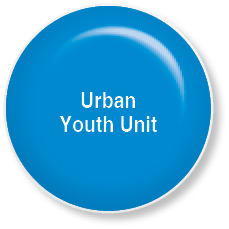
Issue - 1
March-April 2022
Monthly
Inclusive Cities Centre (ICC)
A Big Step Towards Making URDPFI Guidelines more Inclusive
Building Accessible, Safe and Inclusive Indian Cities (BASIIC)
The National Institue of Urban Affairs with the Building Accessible, Safe and Inclusive Indian Cities (BASIIC) Programme, in association with IIT-Kharagpur had initiated the revision of the Urban and Regional Development Plans Formulation and Implementation (URDPFI) Guidelines.The revision was suggested with an aim of mainstreaming universal accessibility and inclusive development of the built environment. The Ministry of Housing and Urban Affairs (MoHUA) endorsed and promoted the revisions in the URDPFI Guidelines to all the Town and Country Planning Offices of India for considering and incorporating the provisions under the guidelines during the preparation of upcoming development plans.
There has been a major shift from a Charity-based Approach to Rights-based Approach for Empowerment of PwDs: Ajay Suri
BASIICBuilding Accessible, Safe and Inclusive Indian Cities (BASIIC)
Speaking at a webinar—Demystifying Disabilities—organised by Microsoft on 28 February, Mr. Ajay Suri, Head-Inclusive Cities Centre at NIUA highlighted upon assess the policy landscape and planning regime for disability inclusion in urban space and recommend changes to plug the gaps.
Let’s Talk Inclusion
Building Accessible, Safe and Inclusive Indian Cities (BASIIC)
Episode 1: Youth Engagement for Inclusive Growth
India has more than 50% of its population below the age of 25 years and more than 65% below the age of 35. Moreover, around 62.5% of India’s working-age population is aged between 15 and 59 years. We are a country that has a huge young population that is working currently and a considerable proportion of the population that is in the transition and getting ready to enter the workforce.
In this inaugural episode of ‘Let’s Talk Inclusion’, under the project Shaping Youth Futures, we converse with Roshni K. Nuggehalli, Executive Director, Youth for Unity and Voluntary Action for the need for youth participation in policy-making for urban and social development and why is it important for them to have a voice and agency for their empowerment. We deep dive to explore ways in which the youth can be engaged in policy and decision making for promoting inclusive development in India.
To know more about youth inclusion in detail, listen to our latest podcast.
Why a Shift in Perspective is Required for Disability Inclusion!
Building Accessible, Safe and Inclusive Indian Cities (BASIIC)
For a long time, Persons with Disabilities have been stigmatized, patronized and discriminated against for their disability rather than being enabled to participate in India’s development efforts. Though the country is moving towards making its urban centres more accessible for everyone, there is the need to address the attitudinal and social barriers that are embedded amongst the people due to longstanding notions and cultural and religious beliefs. Hence, to make the urban infrastructure truly inclusive and accessible for all, it is important that all people feel included and have a sense of belonging. It is important to sensitise the city stakeholders, including communities at large to the needs of Persons with Disabilities and their caregivers.
To know more about how we can address attitudinal and social barriers, read our latest blog.
Capacity Building of Government Officials and Young Professionals under ITCN Programme
Infant, Toddler and Caregiver-Friendly Neighbourhoods Capacity Building Programme(ITCN)
NIUA in partnership with CEPT Research and Development Foundation has developed training modules and will organize Training of Trainers of 5 agencies. The module preparation has been curated to include the knowledge products developed under NIUA and BvLF’s partnership Programme such as Child Friendly Smart Cities (CFSC). The idea is to demonstrate how important it is for cities to integrate the holistic needs of young children (0-6 years) and their caregivers while designing city-level policies, plans and support services that are responsive to their needs and situations.
Bits and Bytes
Infant, Toddler and Caregiver-Friendly Neighbourhoods Capacity Building Programme(ITCN)
Must Haves for Children in a City!
Training of city stakeholders for a better understanding of the importance of Early Childhood Development (ECD) and linking the ECD with urban planning.
Inclusion of caregivers as stakeholders for city planning consultation groups.
Inclusion of ITC indicators for assessing young child and caregiver friendliness in cities.
Social Benefits of Restoring Heritage
Stay Tuned for…
BASIIC and ITCN
1) Lecture Series on Addressing Inclusion in the Urban and Social Development A series of lectures with urban academicians and subject experts will present concepts, ideas, tools and ways that could help achieve inclusive development in India through urban planning and city management tools. The focus will be to address the social, spatial, economic and digital needs of the vulnerable population, how do these intertwine and fortify each other in an urban environment. This will be done by undertaking case studies and developing a solutions-oriented approach, set in the Indian context.
2) National Conclave on Gender & Disability Inclusion in Indian Cities
Thursday, 30th March 2022 to 1st April 2022
Feedback Form
BASIIC and ITCN
Let us know the topics you would like us to explore on
Click on the link for feedback
Climate Centre for Cities (C-Cube)
Climate Change Awareness Campaign
Climate Centre for Cities (C-Cube)
- With the support from the Ministry of Housing and Urban Affairs, the Climate Centre for Cities (C-CUBE) at the National Institute of Urban Affairs organized Climate Change Awareness Campaign from 27 December 2021 to 27 February 2022. The campaign aimed to sensitize the challenges posed by climate change, enrich the participants with ideas to solutions, and promote climate action in cities. As part of the campaign, the following events were organized.
- City-level Climate Change Awareness Campaign: More than 34 Smart cities organized over 130 events by joining hands with community groups and academic institutions
- Climate Action Pledge on Republic Day: More than 8,000 students from schools and colleges have taken the climate actions pledge on 73rd Republic Day.
- City Level Social Media Campaign: More than 80 cities carried out social media campaigns. A total of 4 million impressions were recorded on social media on the posts by various cities across the country.
- National Photography Competition: The National Photography Competition has received over 1200 entries from participants across the country. On similar lines, around 18 Smart cities organized city-level photography completion on climate impacts and climate actions.
Strengthening Indo-European Ties in the Urban Sector with Sciences Po Collaboration
City Investments To Innovate, Integrate & Sustain (CITIIS)
NIUA and Sciences Po signed an agreement on 10 March 2022 to formalise a collaboration between the two institutions. Sciences Po is a premier research university of the social sciences, based in Paris. The collaboration is aimed at facilitating a knowledge exchange, building the capacities of public officials, and bridging the gap between research and practice in the urban sector.
The virtual signing was attended by Mr Kunal Kumar, Joint Secretary & Mission Director, Smart Cities Mission, Ministry of Housing and Urban Affairs, Mr Hitesh Vaidya, Director, NIUA, Mr Naim Keruwala, Program Director, CITIIS-NIUA, Mr Bruno Bosle, Country Director for India, AFD, and Mr Laurent le Danois from the EU Delegation to India.
From Sciences Po, the event was attended by Ms Kate Vivian, Interim Director for International Affairs, Prof Patrick Le Gales, Dean, Urban School, Ms Ilaria Milazzo, Executive Director, Urban School, Prof Tommaso Vitale, Scientific Director, Master Governing the Large Metropolis, Urban School, and Prof Sukriti Issar, Assistant Professor, Department of Sociology.
Speaking at the signing, Mr Kunal Kumar lauded the partnership as an opportunity to identify areas of intervention in the Indian and European urban sectors and work together using practical solutions that involve “less paper and more project”.
As part of the collaboration, five students from the Master in Governing the Large Metropolis program will study three CITIIS projects for their capstone project. Work on the project has already commenced. The students will analyse the riverfront development projects in Agartala, Hubballi-Dharwad, and Surat and deliver an ecological transition framework as a practical tool for policymakers, along with presenting other findings to relevant CITIIS stakeholders.
Families receive new homes under Agartala CITIIS project
City Investments To Innovate, Integrate & Sustain (CITIIS)
As part of the CITIIS project in Agartala, 37 families living on the banks of the river Haora have been resettled into new houses in the Radha Nagar Abasan area. 9 families have already been moved into the Radha Nagar Abasan area.These families were particularly vulnerable as the flooding of the river every year affected their lives and property. Many of them also lived in unhygienic conditions and had to move to relief camps when the river overflowed.After regular stakeholder meetings, the affected people are now being provided with homes in resilient and disaster-free areas of the city. The project is also providing them with subsistence allowance and transportation costs for a year.These efforts are part of the CITIIS project in Agartala, which is developing the Haora riverfront to strengthen its embankments, improve sanitation, facilitate non-motorised transport infrastructure and create green open spaces.
CITIIS project site becomes centre of Vasant Panchami celebrations in Ujjain
City Investments To Innovate, Integrate & Sustain (CITIIS)
To mark the auspicious day of Saraswati Puja and Vasant Panchami, Ujjain Smart City Limited (USCL) organised activities for students of the Nutan Girls School and priests or Teerth Purohits of the Ram Ghat. Ram Ghat, situated on the banks of the River Kshipra, is among the key sites being redeveloped under the CITIIS project in Ujjain, which counts students and priests as two of its most important stakeholder groups.
Mr Ashish Pathak, CEO of USCL, took part in the chanting of the Maa Kshipra Abhishek Mantras by the Teerth Purohits. This was followed by a rangoli-making and painting activity which saw the enthusiastic participation of 120 students of the Nutan Girls School. The activities were organised in collaboration with the Triveni Museum.
The CITIIS project in Ujjain is developing interactive public spaces by upgrading existing infrastructure in and around the Mahakal Temple and Ram Ghat, restoring the Maharajwada complex, creating pedestrian access pathways and resting areas, and revitalising the Rudrasagar Lake. The spring festivities were part of outreach activities for wider awareness of the project.
CITIIS allotted Rs 334 crores in Union Budget 2022-23
City Investments To Innovate, Integrate & Sustain (CITIIS)
The CITIIS program has found mention in the Union Budget again this year. Named under the category of ‘Urban Rejuvenation Mission: AMRUT and Smart Cities Mission’, the program has received funds worth Rs 334 crores as per the Union Budget 2022-23 unveiled in February. These funds shall be disbursed to the 12 cities which form the CITIIS cohort. CITIIS or the City Investments to Innovate, Integrate and Sustain is a joint program of the Ministry of Housing & Urban Affairs, French Development Agency (AFD), European Union and National Institute of Urban Affairs. Under this program, 12 cities selected through a challenge process are receiving financial and technical assistance to implement sustainable and innovative urban infrastructure projects.
Paramita Datta Dey Represents NIUA at Circular Economy Solutions Dialogues 2022
Sustainable Cities Integrated Approach Pilot in India (SCIAP)
The Circular Economy Solutions Dialogue (CESD) series was hosted by GIZ in cooperation with the Global Solutions Initiative on 9 March. Ms. Paramita Datta Dey, Head, Resource and Waste at NIUA was invited as a panellist to the series. She highlighted upon India’s role in G20 and how the country has emphasised the concept of circular economy through policy intervention like vehicle scrap policy, National hydrogen mission and Swachh Bharat Mission.
SAAR Marches Forward
Smart-cities and Academia towards Action and Research (SAAR)
SAAR (Smart-cities and Academia towards Action and Research) is a joint initiative by the Ministry of Housing and Urban Affairs, NIUA and leading Indian academic institutions. It has created a platform for collaborative action between the academia and flagship urban missions. The key purpose of SAAR is to maximize learnings for students, institutions, and cities.
The first activity under SAAR is to develop a compendium on the urban projects implemented by the Smart Cities Mission. The objective of the compendium is to act as a first point of reference for future research in the field of urban development, help disseminate learnings from projects under the Smart Cities Mission, act as a repository for innovative urban projects, and contribute to dissemination of best practices and peer-to-peer learning.
15 premier Planning and Architecture Institutions from India have been selected to study 106 projects to be included in the compendium. These are distributed across 46 Smart Cities and broadly fit into three themes namely, (i) 45 projects in Data & Technology, (ii) 34 projects in Climate Change & Resilient Cities, and (iii) 27 projects in Urban Infrastructure.
SAAR was launched on 5 January 2022 as part of the Azadi ka Amrut Mahotsav (AKAM). The programme includes four steps—preliminary analysis on the projects background, meetings with the Smart City officials and stakeholder consultations, site visits and data collection, and documentation of final project manuscripts.
So far, the site visits are complete, and the Institutions are in the process of preparing the final manuscript, which is the major output from the SAAR programme. It includes a general description about the projects, and specifically documents the need, results, impacts, data analysis, issues and challenges, significance, and way forward for the projects. The manuscripts will be received by 22 April. There will be zonal workshops to be conducted during the first week of May.
Centre for Digital Governance (CDG)
NUDM Fellowship Commences
National Urban Digital Mission (NUDM)
The National Urban Digital Mission (NUDM) Fellowship Program is a joint initiative of the Ministry of Housing and Urban Affairs (MoHUA) and NIUA to support state and UT governments in implementing the initiatives of the Mission. As the inaugural cohort, the Fellows are dynamic young professionals who have experience in public policy, IT and other related domains. The incoming cohort consists of 18 Fellows, who have been inducted into the Fellowship Program through orientation sessions that leveraged the expertise of NIUA’s senior faculty to instruct the Fellows on their role in supporting the implementation of digital initiatives across India.
Request for Empanelment for Shortlisting ‘IMPLEMENTATION PARTNERS’ for implementation of National Urban Governance Platform & Reference Municipal Service Applications at States/ UTs
National Urban Digital Mission (NUDM)
To give impetus to the National Urban Digital Mission (NUDM), NIUA has empaneled 28 registered firms as the eligible entities for NUDM implementation. This pool of firms will undergo a selection process for Implementation Partners at respective States/ UTs to implement National Urban Governance Platform (NUGP) and reference municipal applications under NUDM. The empanelment is subject to be revised half yearly based upon the performance and entry of new eligible firms.
NULP - City Onboarding: Gangtok and Thiruvanthapuram
National Urban Learning Platform (NULP)
Two new cities i.e. Gangtok Municipal Corporation and Thiruvanthapuram Smart city are onboarded on the platform through the virtual onboarding sessions. The session includes a brief presentation followed by a demo and an interactive session to understand the learning needs of the cities. Solid waste management, town planning ,solar projects and E-governance are the few key areas which were highlighted by the cities for their skill enhancement.
NULP - Dissemination at Scaling up street transformation projects workshop
National Urban Learning Platform (NULP)
The team participated and presented in the session titled” Scalability through a knowledge sharing platform: connecting people and best practices” on 11th March 2022.The presentation was focused on explaining its approach of peer to peer learning along with its learnings, city needs summary available best practices and live courses. The presentation was followed by a discussion on how this platform can aid the capacity building at the cities.
NULP State visit: SUDA, Jharkhand
National Urban Learning Platform (NULP)
The Central Program Management Unit visited SUDA, Jharkhand on 11th March 2022 to initiate the conversation regarding introducing NULP to all their ULBs.The team interacted with capacity building specialist along with the other officials to chart out the strategy to onboard the ULBs in Jharkhand on the platform.
Recent Publications











